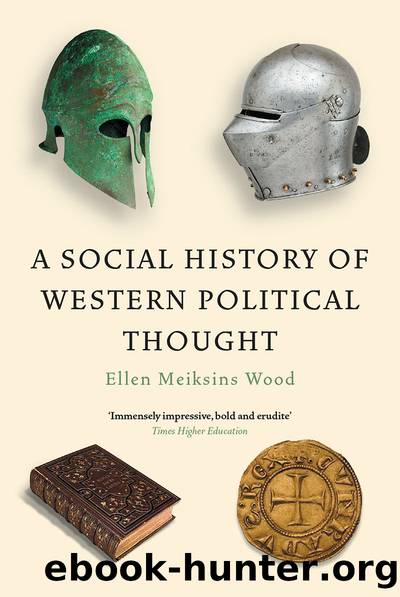A Social History of Western Political Thought by Wood Ellen Meiksins;

Author:Wood, Ellen Meiksins;
Language: eng
Format: epub
Publisher: Verso Books
John Calvin
The city of Geneva, where John Calvin would find his spiritual home, had, like other cities in the Holy Roman Empire, long been a battleground for power struggles among bishops, counts and dukes. In the Middle Ages, the bishop of Geneva had been a prince of the Empire; but there were constant battles between the bishops and other princely claimants, eager to gain access to the fruits of the cityâs commercial success. When the House of Savoy sought to turn Geneva into a duchy, the city countered the threat by joining the Swiss federation in 1526; but this union would soon be disrupted by a division between Catholic and Protestant cities. When Geneva finally asserted its autonomy as a republic in 1536, it did so under the banner of Protestantism, for obvious practical and economic no less than spiritual reasons, and managed to maintain its independence as a city-state against prevailing trends.
Calvin would arrive in Geneva the year of its establishment as a Protestant republic, and â except for a period of exile from 1538 to 1541 â he would stay there until his death in 1564. Born in France in 1509 as Jean Cauvin, he began his career as clerk to a bishop; intended for the priesthood, he studied philosophy in Paris, but then gave up the Church for the study of law. At the University of Bourges, he came under humanist influences. The exposure to humanism clearly played a major part in his religious conversion; and like other humanist reformers, he would soon abandon the Catholic Church. On his return to Paris, caught up in conflicts between the reformers and the orthodox Catholics, he was compelled to flee and in 1535 settled for a time in the Protestant city of Basle.
It was during his stay in Basle that Calvin, in 1536, published the first edition of his major lifeâs work, the Institutes of the Christian Religion, a catechism of his faith and the principles of reformation to which he subscribed. Written first in Latin, it would later appear in French editions, which would have an enormous influence not only on theology but also on the French language. He would continue to edit and amplify this work throughout his life. On his return to Paris from Basle, finding his reforming views unwelcome in his native France, he set out for the free imperial city of Strasbourg; but, forced by circumstances to take a detour, he arrived in Geneva, and there he would remain.
Calvin settled in Geneva at the urging of another Frenchman, who invited him to join in reforming the Church. Their proposals for ecclesiastical reform, undertaken at the behest of civic authorities, were immediately accepted by the city council. Although Calvin would find himself in conflict with the council in 1538 and yet again forced into exile, the civic authorities of Geneva invited him to return in 1541 to carry on his project of reform. In November of that year, the council amended and passed the Ecclesiastical
Download
This site does not store any files on its server. We only index and link to content provided by other sites. Please contact the content providers to delete copyright contents if any and email us, we'll remove relevant links or contents immediately.
| Arms Control | Diplomacy |
| Security | Trades & Tariffs |
| Treaties | African |
| Asian | Australian & Oceanian |
| Canadian | Caribbean & Latin American |
| European | Middle Eastern |
| Russian & Former Soviet Union |
The Secret History by Donna Tartt(16626)
The Social Justice Warrior Handbook by Lisa De Pasquale(11489)
Thirteen Reasons Why by Jay Asher(7788)
This Is How You Lose Her by Junot Diaz(5774)
Weapons of Math Destruction by Cathy O'Neil(5037)
Zero to One by Peter Thiel(4824)
The Myth of the Strong Leader by Archie Brown(4789)
Promise Me, Dad by Joe Biden(4449)
Beartown by Fredrik Backman(4419)
Stone's Rules by Roger Stone(4416)
How Democracies Die by Steven Levitsky & Daniel Ziblatt(4399)
The Fire Next Time by James Baldwin(4343)
100 Deadly Skills by Clint Emerson(4079)
A Higher Loyalty: Truth, Lies, and Leadership by James Comey(4033)
Rise and Kill First by Ronen Bergman(4012)
The David Icke Guide to the Global Conspiracy (and how to end it) by David Icke(3883)
The Farm by Tom Rob Smith(3872)
Secrecy World by Jake Bernstein(3783)
The Doomsday Machine by Daniel Ellsberg(3731)
